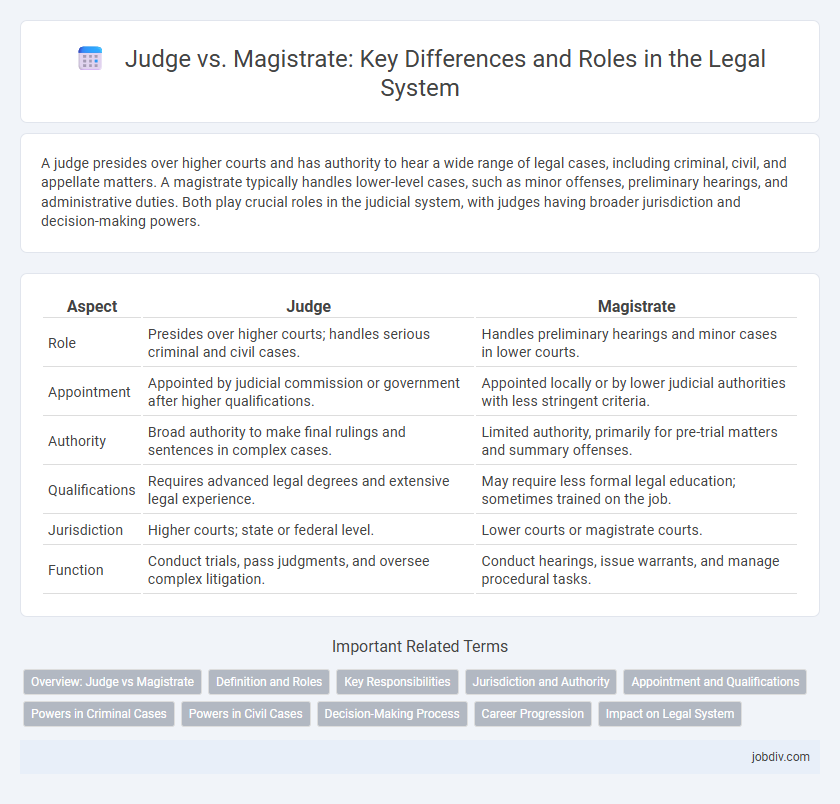A judge presides over higher courts and has authority to hear a wide range of legal cases, including criminal, civil, and appellate matters. A magistrate typically handles lower-level cases, such as minor offenses, preliminary hearings, and administrative duties. Both play crucial roles in the judicial system, with judges having broader jurisdiction and decision-making powers.
Table of Comparison
| Aspect | Judge | Magistrate |
|---|---|---|
| Role | Presides over higher courts; handles serious criminal and civil cases. | Handles preliminary hearings and minor cases in lower courts. |
| Appointment | Appointed by judicial commission or government after higher qualifications. | Appointed locally or by lower judicial authorities with less stringent criteria. |
| Authority | Broad authority to make final rulings and sentences in complex cases. | Limited authority, primarily for pre-trial matters and summary offenses. |
| Qualifications | Requires advanced legal degrees and extensive legal experience. | May require less formal legal education; sometimes trained on the job. |
| Jurisdiction | Higher courts; state or federal level. | Lower courts or magistrate courts. |
| Function | Conduct trials, pass judgments, and oversee complex litigation. | Conduct hearings, issue warrants, and manage procedural tasks. |
Overview: Judge vs Magistrate
Judges preside over higher courts and handle more complex civil and criminal cases, while magistrates typically oversee lower courts, managing less serious offenses and preliminary hearings. Judges have broader authority, including sentencing powers and ruling on motions, whereas magistrates often assist by conducting initial proceedings and administrative tasks. The distinction lies in jurisdictional scope, authority, and the nature of cases each is empowered to adjudicate.
Definition and Roles
A judge presides over court proceedings, making decisions on legal matters, interpreting laws, and ensuring fair trials in both criminal and civil cases. Magistrates handle preliminary judicial duties such as issuing warrants, conducting hearings for minor offenses, and managing bail processes, often acting as judicial officers in lower courts. While both operate within the judiciary, judges wield broader authority and preside over more complex cases compared to magistrates.
Key Responsibilities
Judges preside over higher court trials, making rulings on complex legal issues, interpreting laws, and delivering final verdicts in civil and criminal cases. Magistrates handle preliminary matters such as issuing warrants, conducting bail hearings, and managing minor offenses or procedural hearings in lower courts. Both roles are essential for ensuring judicial efficiency, but judges carry broader authority and decision-making power in the legal system.
Jurisdiction and Authority
Judges possess broader jurisdiction and authority, typically presiding over higher court cases including civil, criminal, and appellate matters, while magistrates handle limited jurisdiction cases such as preliminary hearings, minor offenses, and small claims. Judicial authority grants judges the power to make final rulings and oversee complex legal proceedings, whereas magistrates primarily manage procedural aspects and issue warrants or summons. Understanding the distinction in jurisdiction and authority helps clarify the specific roles each judicial officer plays within the legal system.
Appointment and Qualifications
Judges are typically appointed through a rigorous selection process involving gubernatorial or presidential nomination and legislative approval, requiring extensive legal experience, often a minimum of 10 years practicing law or prior judicial service. Magistrates are usually appointed by judges or court panels for specific terms, with qualifications varying by jurisdiction but generally requiring a law degree and some legal or judicial experience. Both roles demand a strong understanding of legal principles, but judges tend to have more stringent appointment criteria reflecting their broader authority and responsibilities.
Powers in Criminal Cases
Judges possess broader powers in criminal cases, including the authority to preside over felony trials, impose sentences, and rule on pretrial motions. Magistrates typically handle preliminary matters such as arraignments, bail hearings, and misdemeanor cases, with limited sentencing authority. The distinction in powers reflects differences in jurisdiction, with judges exercising full trial and sentencing functions, while magistrates perform judicial duties that facilitate the criminal justice process at initial stages.
Powers in Civil Cases
Judges hold broader authority in civil cases, including presiding over trials, issuing final judgments, and ruling on complex legal disputes. Magistrates possess more limited powers, typically handling preliminary matters such as issuing warrants, conducting hearings, and making recommendations to judges. The scope of magistrate powers varies by jurisdiction, often restricted to lower-value claims or procedural functions without the authority to render final civil judgments.
Decision-Making Process
Judges have broader authority to render final decisions in both civil and criminal cases, often presiding over trials and ruling on complex legal issues. Magistrates typically handle preliminary matters such as arraignments, bail hearings, and minor offenses, facilitating speedy resolutions and managing case flow. The decision-making process for judges involves comprehensive evaluation of evidence and legal arguments, whereas magistrates focus on procedural rulings and initial case assessments.
Career Progression
Judges typically advance through extensive legal experience, often starting as attorneys or magistrates before appointment or election to higher courts, reflecting a career path marked by increasing judicial responsibility and authority. Magistrates commonly begin their careers handling preliminary legal matters, such as misdemeanor cases and civil disputes, serving as a critical stepping stone to full judgeships in many jurisdictions. The progression from magistrate to judge involves acquiring deeper legal expertise, judicial temperament, and often meeting specific qualification criteria set by state or federal judicial appointment procedures.
Impact on Legal System
Judges hold authoritative decision-making power in higher courts, shaping legal precedents and influencing the development of law, whereas magistrates typically handle preliminary or minor cases, ensuring efficiency in the judicial process. The division of responsibilities between judges and magistrates enhances case management, reduces court backlogs, and promotes timely access to justice. Their complementary roles maintain judicial balance, with judges addressing complex legal issues and magistrates facilitating procedural matters.
Judge vs Magistrate Infographic

 jobdiv.com
jobdiv.com